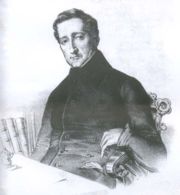
Cesare Balbo
Encyclopedia

Balbo was born at Turin
Turin
Turin is a city and major business and cultural centre in northern Italy, capital of the Piedmont region, located mainly on the left bank of the Po River and surrounded by the Alpine arch. The population of the city proper is 909,193 while the population of the urban area is estimated by Eurostat...
on the 21st of November 1789. His father, Prospero Balbo, who belonged to a noble Piedmontese family, held a high position in the Sardinian court
Kingdom of Sardinia
The Kingdom of Sardinia consisted of the island of Sardinia first as a part of the Crown of Aragon and subsequently the Spanish Empire , and second as a part of the composite state of the House of Savoy . Its capital was originally Cagliari, in the south of the island, and later Turin, on the...
, and at the time of Cesare’s birth was mayor of the capital. His mother, Enrichetta Taparelli d'Azeglio, died when he was three years old; and he was brought up in the house of his great-grandmother, the countess of Bugino. In 1798 he joined his father at Paris
Paris
Paris is the capital and largest city in France, situated on the river Seine, in northern France, at the heart of the Île-de-France region...
. From 1808 to 1814 Balbo served in various capacities under the Napoleonic empire at Florence
Florence
Florence is the capital city of the Italian region of Tuscany and of the province of Florence. It is the most populous city in Tuscany, with approximately 370,000 inhabitants, expanding to over 1.5 million in the metropolitan area....
, Rome
Rome
Rome is the capital of Italy and the country's largest and most populated city and comune, with over 2.7 million residents in . The city is located in the central-western portion of the Italian Peninsula, on the Tiber River within the Lazio region of Italy.Rome's history spans two and a half...
, Paris
Paris
Paris is the capital and largest city in France, situated on the river Seine, in northern France, at the heart of the Île-de-France region...
and in Illyria
Illyria
In classical antiquity, Illyria was a region in the western part of the Balkan Peninsula inhabited by the Illyrians....
. On the fall of Napoleon he entered the service of his native country. While his father was appointed minister of the interior, he entered the army, and undertook political missions to Paris
Paris
Paris is the capital and largest city in France, situated on the river Seine, in northern France, at the heart of the Île-de-France region...
and London. On the outbreak of the revolution of 1821, of which he disapproved, although he was suspected of sympathizing with it, he was forced into exile; and though not long after he was allowed to return to Piedmont, all public service was denied him.
Reluctantly, and with frequent endeavours to obtain some appointment, he gave himself up to literature as the only means left him to influence the destinies of his country. The great object of his labours was to help in securing the independence of Italy from foreign control. Of true Italian unity he had no expectation and no desire, but he was devoted to the house of Savoy, which he foresaw was destined to change the fate of Italy. A confederation of separate states, not under the supremacy of the pope like Gioberti
Vincenzo Gioberti
thumb|250px|Vincenzo Gioberti.Vincenzo Gioberti was an Italian philosopher, publicist and politician.-Biography:Gioberti was born in Turin....
, but led by Piedmont, was the genuine ideal of Balbo. But Gioberti, in his Primato, seemed to him to neglect the first essential of independence, which he accordingly inculcated in his Speranze or Hopes of Italy, in which he suggests that Austria should seek compensation in the Balkans
Balkans
The Balkans is a geopolitical and cultural region of southeastern Europe...
for the inevitable loss of her Italian provinces. Balbo believed that the papacy could become an enemy of a large, united Italy (as it did, indeed, become for many years). Preparation, both military and moral, alertness and patience were his constant theme.
He did not desire revolution, but reform; and thus he became the leader of a moderate party, and the steady opponent not only of despotism
Despotism
Despotism is a form of government in which a single entity rules with absolute power. That entity may be an individual, as in an autocracy, or it may be a group, as in an oligarchy...
but of democracy
Democracy
Democracy is generally defined as a form of government in which all adult citizens have an equal say in the decisions that affect their lives. Ideally, this includes equal participation in the proposal, development and passage of legislation into law...
. At last in 1848 his hopes were to some extent satisfied by the constitution granted by the king, known as the Statuto albertino
Statuto Albertino
The Statuto Albertino or Albertine Statute was the constitution that King Charles Albert conceded to the Kingdom of Piedmont-Sardinia in Italy on 4 March 1848...
. He was appointed a member of the commission on the electoral law, and became first constitutional prime minister of Piedmont, but only held office a few months. With the ministry of d’Azeglio, which soon after came to power, he was on friendly terms, and his pen continued the active defence of his political principles till his death on the 3rd of June 1853. He published Quattro Novelle in 1829; Storia d’Italia sotto i Barbari in 1830; Vita di Dante, 1839; Meditazioni Storiche, 1842—1845; Le Speranze d’Italia, 1844; Pensieri sulla Storia d’Italia, 1858; Della Monarchia rappresentativa in Italia (Florence
Florence
Florence is the capital city of the Italian region of Tuscany and of the province of Florence. It is the most populous city in Tuscany, with approximately 370,000 inhabitants, expanding to over 1.5 million in the metropolitan area....
, 1857).

